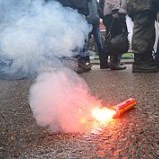Defense Minister Anatoly Serdyukov was fired this week. The ostensible reason had to do with the corruption scandal that recently engulfed Oboronservis. But we all know that no one in the top echelons of the Russian government gets fired for corruption, unless there’s some other reason for their removal. The subtext here is that Serdyukov had made an enemy of Viktor Zubkov, the powerful former Prime Minister and current chair of Gazprom’s board, and also Serdyukov’s father-in-law and former patron.
The corruption scandal focused on Yevgenia Vasilyeva, the former head of the MOD’s property department. Various sources have indicated that when her apartment was raided as part of the corruption probe at 6am on Oct 25, Serdyukov was there. Furthermore, Vasilyeva’s apartment was in the same building as Serdyukov’s. The building had been requisitioned several years ago to serve as the reception hall for the Defense Ministry but then converted to private apartments for the two of them. It seems that the two of them had been having an affair for some time.
I don’t know why this long-standing situation became intolerable recently. It may be, as implied by today’s New York Times report, that Zubkov only recently became aware of the situation, after Serdyukov and his wife separated. Or it may be that it took time for Zubkov to receive a green light from Putin to launch the attack. In any case, we know that only five months ago, Serdyukov had wanted to leave his position and had to be personally persuaded by Putin to stay on. So whatever happened to change the situation has happened over the summer or fall.
Another interesting aspect of the situation is that two weeks passed between the raid on Vasilyeva’s apartment and Serdyukov’s removal. Initially, it seemed to me that the raid was meant as a signal to Serdyukov to sort out his personal life and that he was not in danger of removal. If he had meant to remove Serdyukov, Putin could have done so without the raid or (if he wanted Serdyukov humiliated) could have done so immediately after the raid. The delay implies either that Serdyukov was unable to come to terms with Zubkov and therefore had to be jettisoned by the ruling clan or that Zubkov was determined to have Serdyukov out despite Putin’s initial reluctance and needed the two weeks to prevail. (The latter point of view is well-expressed by Aleksandr Golts.)
Putin has appointed Sergei Shoigu, the long-standing head of the Emergencies Ministry who had been serving as Moscow Oblast governor for the last few months. This move has implications for both the military and the Russian political system at large. For the political system, it means that Putin has few people left he can trust. Serdyukov was long seen as irreplaceable precisely because there were so few people who combined his qualities of effective managerial ability and personal loyalty to Putin. Shoigu is one such person, which is probably why he was brought in as Serdyukov’s replacement even though he had only recently been appointed to run Moscow Oblast.
The burning question, though, is what happens to the military in general and the reform effort in particular with Shoigu as Defense Minister. Shoigu is in some ways like Sergei Ivanov was — someone with vast experience in the security services, but little connection the military itself. By all accounts, he did an incredible job establishing and running the Emergencies Ministry. If he can combine his managerial abilities with a manner that is less brusque than Serdyukov’s, he might succeed in maintaining momentum on the reform agenda without alienating the officer corps. Of course, this will depend on a continued reaffirmation of support for reform by Putin, but that seems in little doubt given the extent to which Putin is invested in the reform’s success. This will be especially needed to counter those officers who may be emboldened by Serdyukov’s removal and may seek to roll back some of the reform’s achievements.
Shoigu has a reputation as an honest and relatively uncorrupt official. He may end up being far more effective at eliminating entrenched corruption at the MOD than Serdyukov (who seems to have simply had his own people take over the most profitable schemes). We may get an early signal of the future of the reform effort if Chief of the General Staff Nikolai Makarov retires (as expected) in December. If Makarov is replaced by someone who is seen as a strong supporter of reform, then Serdyukov’s reform plan is likely to continue. If he is replaced by a member of the old guard, that may be a sign that the achievements of the last four years are about to be rolled back. Of course, Makarov’s reappointment, though unlikely, would also be a signal that reform remains on track.
Serdyukov’s removal may initially be taken as a victory for the anti-reform forces. But it may turn out that his “bulldozer” methods have done as much as they could. In that case, Shoigu could turn out to be exactly the right person for the job of solidifying the changes enacted over the last four years.
Dmitry Gorenburg is a Senior Analyst at CNA blogging for PONARS Eurasia on military and security affairs in Russia and Eurasia. This comment is also available on Russian Military Reform.









